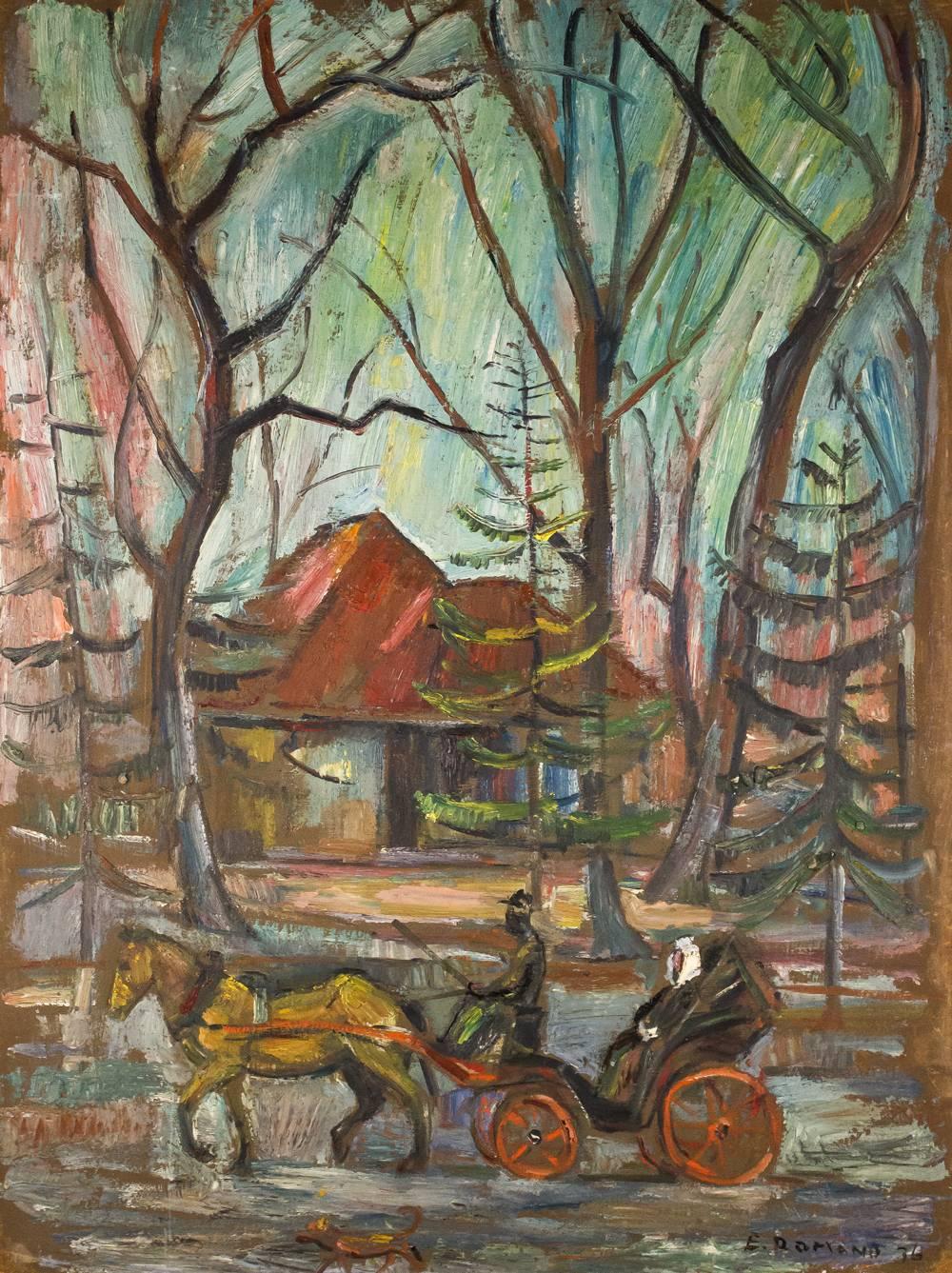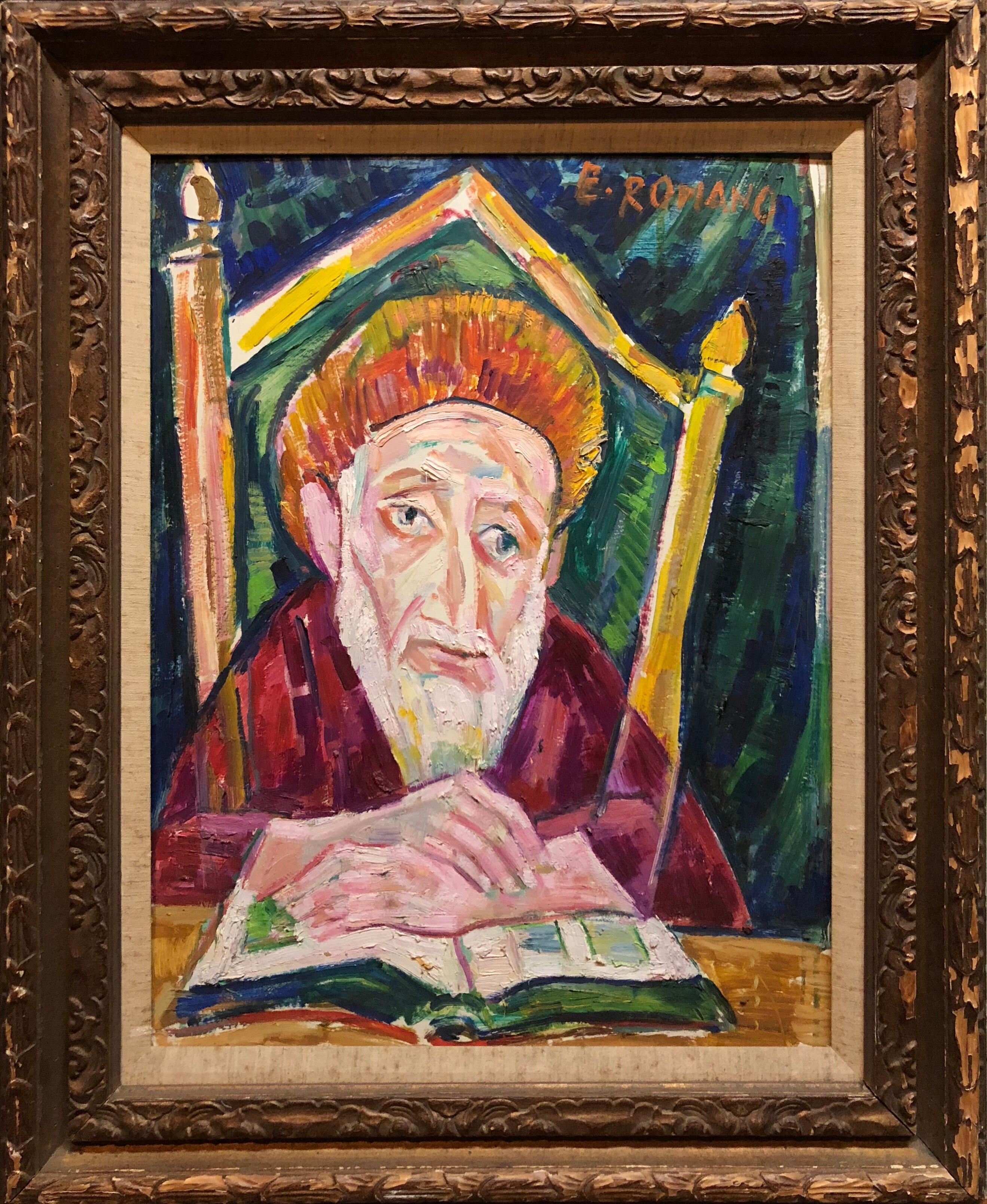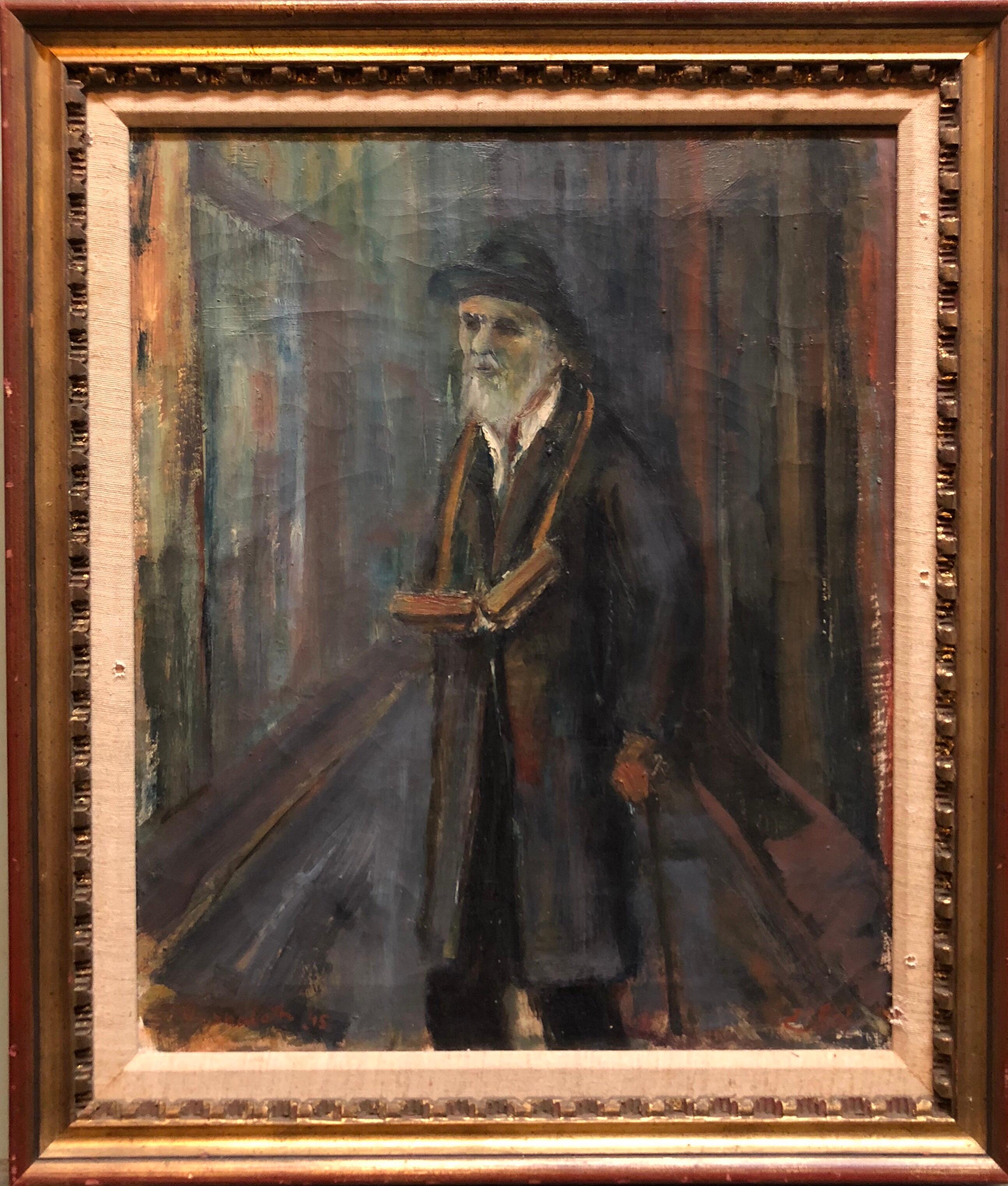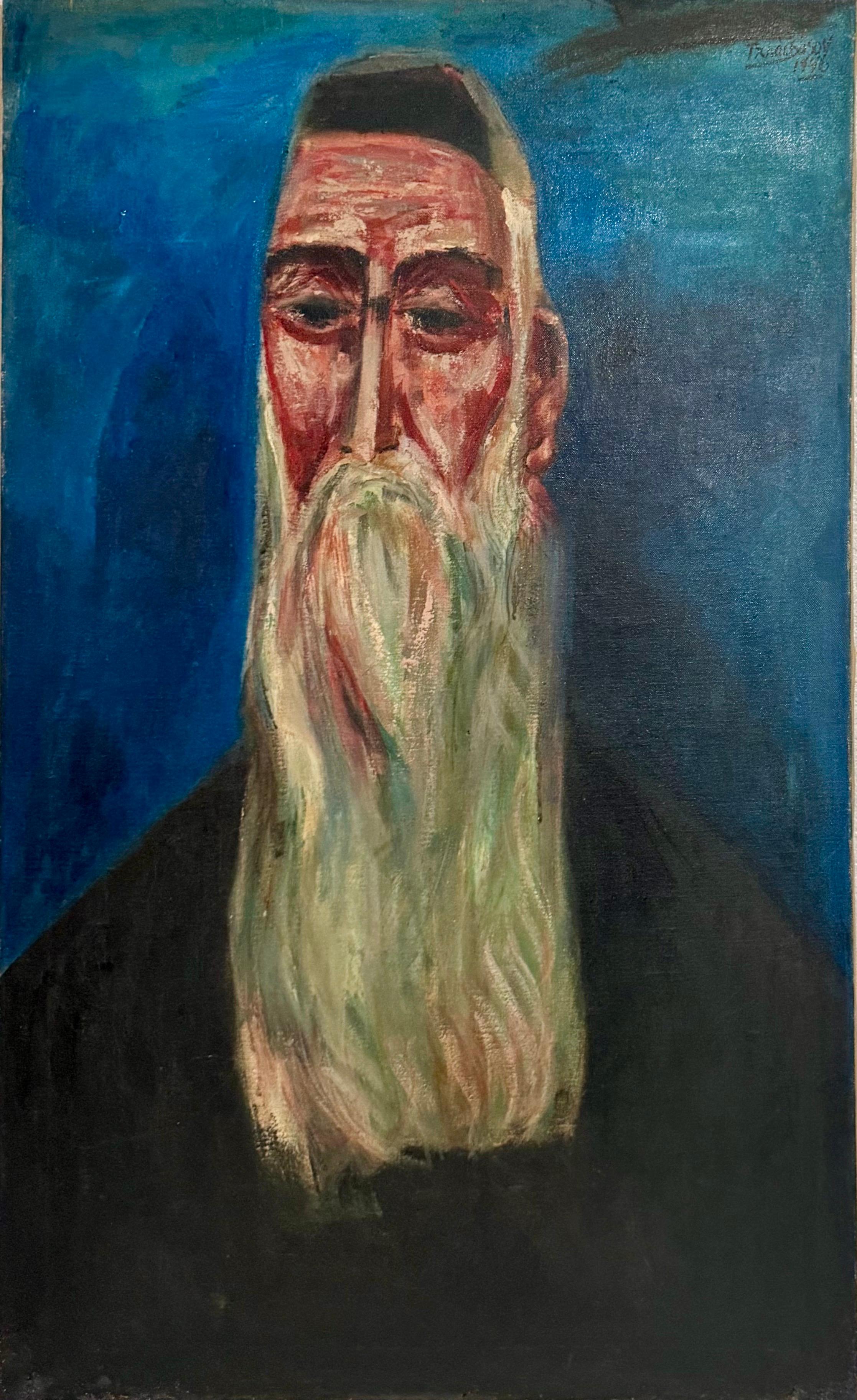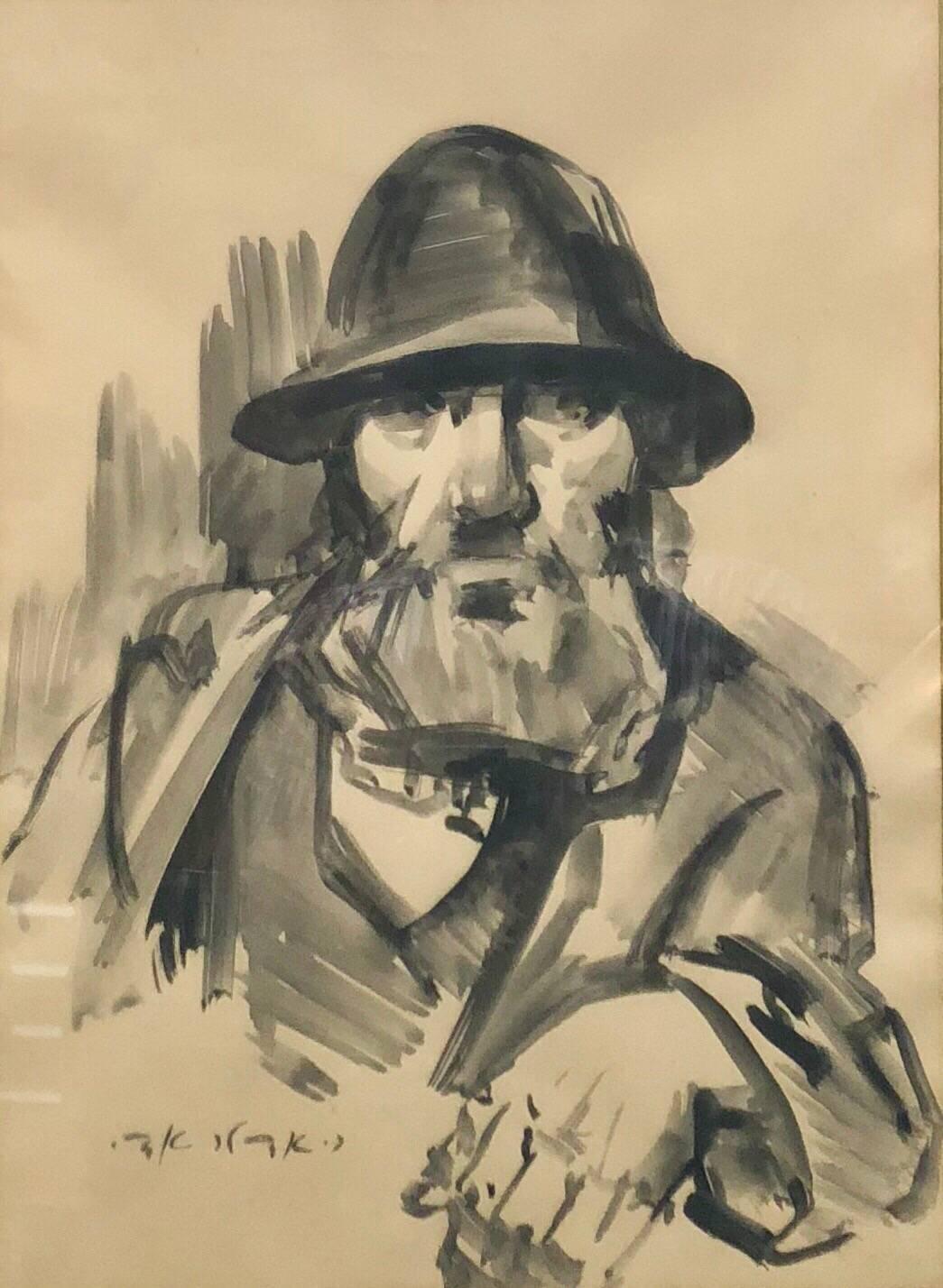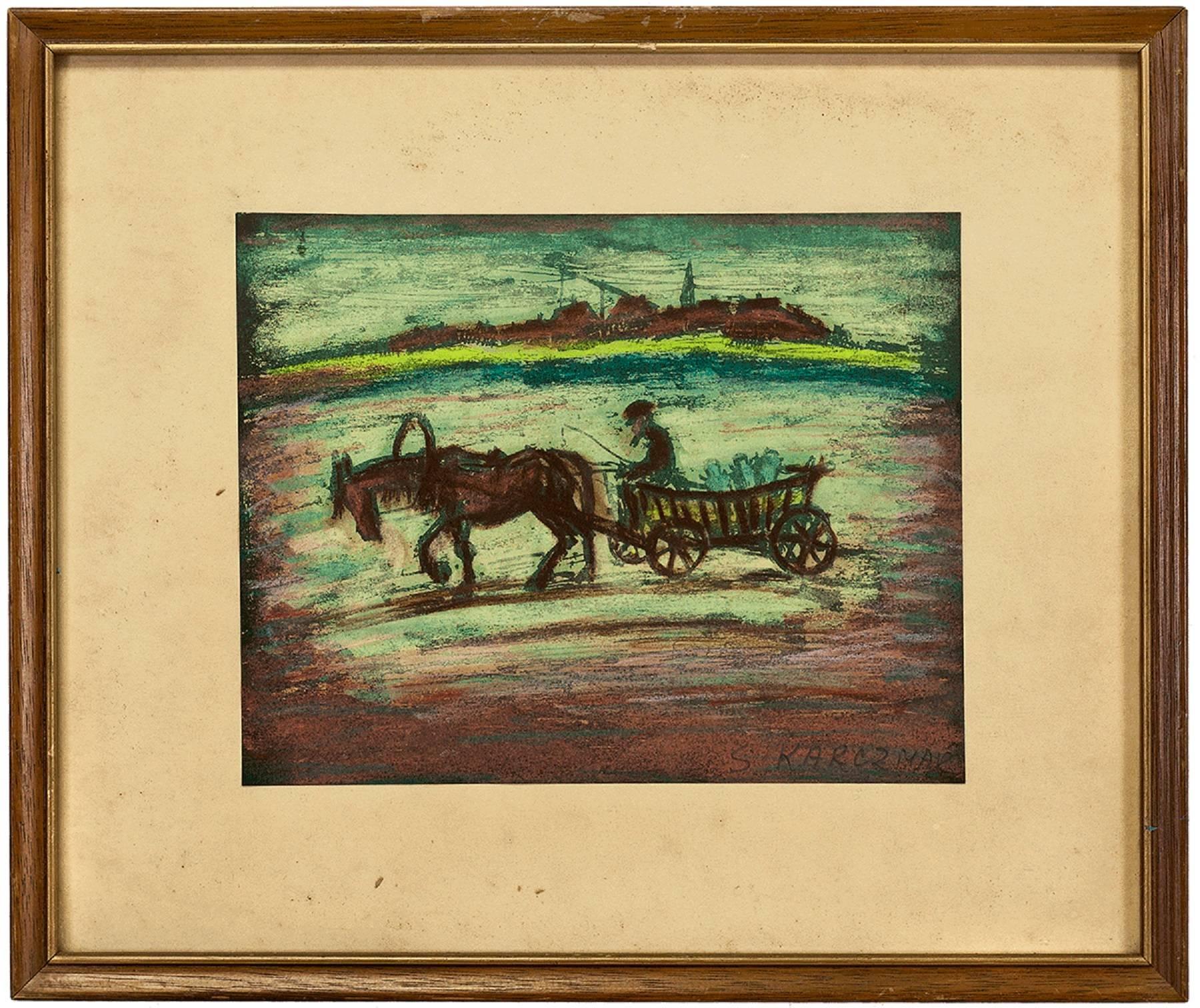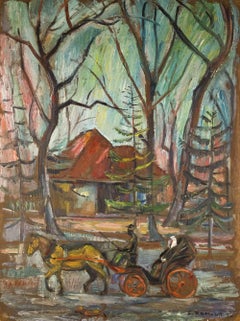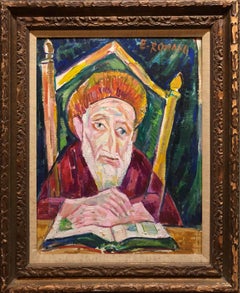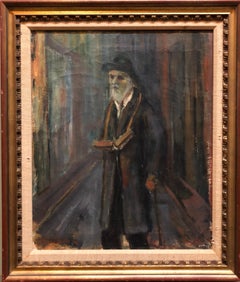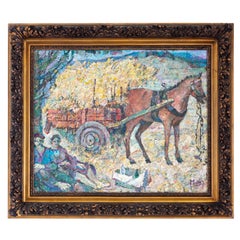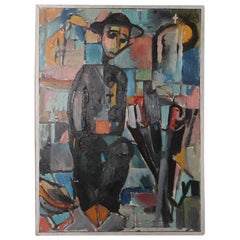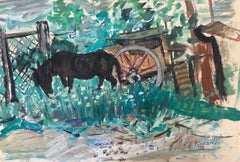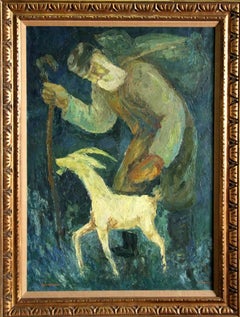Items Similar to Large Modernist Oil Painting 1940s, Judaica Hasidic Shtetl Wagon Driver WPA Era
Want more images or videos?
Request additional images or videos from the seller
1 of 10
Emanuel Glicenstein RomanoLarge Modernist Oil Painting 1940s, Judaica Hasidic Shtetl Wagon Driver WPA Erac. 1940s
c. 1940s
$5,500
£4,140.99
€4,811.28
CA$7,744.07
A$8,627.45
CHF 4,526.09
MX$105,375.44
NOK 57,308.88
SEK 53,703.16
DKK 35,912.36
About the Item
Genre: Modern
Subject: Landscape with figure of horse, driver and wagon
Medium: Oil
Surface: wood Board
EMANUEL ROMANO
Rome, Italy, b. 1897, d. 1984
Emanuel Glicen Romano was born in Rome, September 23, 1897.
His father Henryk Glicenstein was a sculptor and was living in Rome with his wife Helena (born Hirszenberg) when Emanuel was born. His father obtained Italian citizenship and adopted the name Enrico. Emanuel was brought up in Italy, Switzerland, Germany, England and Poland.
In 1926 Emanuel Glicenstein Romano and his father sailed for New York. They briefly visited Chicago. Romano's sister, Beatrice, and mother only joined them in New York years later.
Romano changed his name on his arrival to America and some have erroneously speculated that this was to avoid antisemitic discrimination. In truth, as the son of a highly-regarded artist, Romano changed his name to ensure that any success or recognition he would later attain, would be the result of nothing other than his own merit as an artist, and not on account of his father's fame.
In 1936 Romano was worked for the WPA Federal Art Project creating murals. ( there were many jewish artists active with in the WPA period. notably Chaim Gross, Ben Shahn, Isaac and Moses Soyer, Abraham Rattner and many others. During and immediately after World War II, Romano created a series of allegorical works depicting graphic holocaust images that were held closely by the family until after his passing. One of these works is now on permanent display in the Florida Holocaust Museum in St. Petersburg Florida.
Emanuel's father died in 1942 in a car accident before they could realize their shared dream of visiting Israel.
In 1944 Romano, having completed his degree at the Pennsylvania Academy of Fine Arts and the Art Institute of Chicago, began teaching at the City College of New York.
Romano moved to Safed, Israel in 1953 and established an art museum in his father's memory, the Glicenstein Museum.
COLLECTIONS
Indianapolis Museum of Art
Metropolitan Museum of Art
Boston Fine Arts Museum
Fogg Museum
Musée Nacional de France
Recently his work has been added to the Florida Holocaust Museum collection. His notable works include his holocaust themed allegorical paintings as well as portraits of Marianne Moore, his father and William Carlos Williams. Romano created a well known portrait of T.S. Eliot as well as the woodcuts to illustrate an edition of Eliot's "The Waste Land".
Emanuel Romano died in 1984.
- Creator:Emanuel Glicenstein Romano (1897 - 1984, American, Italian)
- Creation Year:c. 1940s
- Dimensions:Height: 39.75 in (100.97 cm)Width: 32.25 in (81.92 cm)
- Medium:
- Movement & Style:
- Period:
- Condition:wear to frame. minor wear.
- Gallery Location:Surfside, FL
- Reference Number:1stDibs: LU38213290052
About the Seller
4.9
Platinum Seller
Premium sellers with a 4.7+ rating and 24-hour response times
Established in 1995
1stDibs seller since 2014
1,794 sales on 1stDibs
Typical response time: <1 hour
- ShippingRetrieving quote...Shipping from: Surfside, FL
- Return Policy
Authenticity Guarantee
In the unlikely event there’s an issue with an item’s authenticity, contact us within 1 year for a full refund. DetailsMoney-Back Guarantee
If your item is not as described, is damaged in transit, or does not arrive, contact us within 7 days for a full refund. Details24-Hour Cancellation
You have a 24-hour grace period in which to reconsider your purchase, with no questions asked.Vetted Professional Sellers
Our world-class sellers must adhere to strict standards for service and quality, maintaining the integrity of our listings.Price-Match Guarantee
If you find that a seller listed the same item for a lower price elsewhere, we’ll match it.Trusted Global Delivery
Our best-in-class carrier network provides specialized shipping options worldwide, including custom delivery.More From This Seller
View AllLAKEWOOD N.J., 1936 Modernist Oil Painting, Judaica
By Emanuel Glicenstein Romano
Located in Surfside, FL
Genre: Modern
Subject: Landscape
Medium: Oil
Surface: Board
Country: United States
Dimensions: 30" x 22"
EMANUEL ROMANO
Rome, Italy, b. 1897, d. 1984
Emanuel Glicenstein Romano was born in Rome, September 23, 1897.
His father Henryk Glicenstein was a sculptor and was living in Rome with his wife Helena (born Hirszenberg) when Emanuel was born. His father obtained Italian citizenship and adopted the name Enrico. Emanuel was brought up in Italy, Switzerland, Germany, England and Poland.
In 1926 Emanuel and his father sailed for New York. They briefly visited Chicago. Romano's sister, Beatrice, and mother only joined them in New York years later.
Romano changed his name on his arrival to America and some have erroneously speculated that this was to avoid antisemitic discrimination. In truth, as the son of a highly-regarded artist, Romano changed his name to ensure that any success or recognition he would later attain, would be the result of nothing other than his own merit as an artist, and not on account of his father's fame.
In 1936 Romano was worked for the Federal Art Project creating murals. During and immediately after World War II, Romano created a series of allegorical works depicting graphic holocaust images that were held closely by the family until after his passing. One of these works is now on permanent display in the Florida Holocaust Museum in St. Petersburg Florida.
Emanuel's father died in 1942 in a car accident before they could realize their shared dream of visiting Israel.
In 1944 Romano, having completed his degree at the Pennsylvania Academy of Fine Arts and the Art Institute of Chicago, began teaching at the City College of New York.
Romano moved to Safed, Israel in 1953 and established an art museum in his father's memory, the Glicentein Museum.
COLLECTIONS
Indianapolis Museum of Art
Metropolitan Museum of Art
Boston Fine Arts Museum
Fogg Museum
Musée Nacional de France
Recently his work has been added to the Florida Holocaust Museum collection. His notable works include his holocaust themed allegorical paintings as well as portraits of Marianne Moore, his father and William Carlos...
Category
1930s American Modern Figurative Paintings
Materials
Oil, Board
Modernist Oil Painting 1940s, Judaica Hasidic Rabbi in Jerusalem
By Emanuel Glicenstein Romano
Located in Surfside, FL
Genre: Portrait
Subject: Landscape
Medium: Oil
Surface: Board
Country: United States
EMANUEL ROMANO
Rome, Italy, b. 1897, d. 1984
Emanuel Glicenstein Romano was born in Rome, September 23, 1897.
His father Henryk Glicenstein was a sculptor and was living in Rome with his wife Helena (born Hirszenberg) when Emanuel was born. His father obtained Italian citizenship and adopted the name Enrico. Emanuel was brought up in Italy, Switzerland, Germany, England and Poland.
In 1926 Emanuel and his father sailed for New York. They briefly visited Chicago. Romano's sister, Beatrice, and mother only joined them in New York years later.
Romano changed his name on his arrival to America and some have erroneously speculated that this was to avoid antisemitic discrimination. In truth, as the son of a highly-regarded artist, Romano changed his name to ensure that any success or recognition he would later attain, would be the result of nothing other than his own merit as an artist, and not on account of his father's fame.
In 1936 Romano was worked for the Federal Art Project creating murals. During and immediately after World War II, Romano created a series of allegorical works depicting graphic holocaust images that were held closely by the family until after his passing. One of these works is now on permanent display in the Florida Holocaust Museum in St. Petersburg Florida.
Emanuel's father died in 1942 in a car accident before they could realize their shared dream of visiting Israel.
In 1944 Romano, having completed his degree at the Pennsylvania Academy of Fine Arts and the Art Institute of Chicago, began teaching at the City College of New York.
Romano moved to Safed, Israel in 1953 and established an art museum in his father's memory, the Glicentein Museum.
COLLECTIONS
Indianapolis Museum of Art
Metropolitan Museum of Art
Boston Fine Arts Museum
Fogg Museum
Musée Nacional de France
Recently his work has been added to the Florida Holocaust Museum collection. His notable works include his holocaust themed allegorical paintings as well as portraits of Marianne Moore, his father and William Carlos Williams...
Category
1970s American Modern Figurative Paintings
Materials
Oil, Board
Judaica Oil Painting 1945 Palestine Old Jewish Man Polish Israeli Artist
By Ozer Shabat
Located in Surfside, FL
Ozer Shabat 1978-1901
Ozer Shabbat was an Israeli painter, a resident of Haifa. Belonged to the Palestine Expressionist group of the late 1920s and early 1930s.
Shabbat was born in Wolbrom, Poland. At the end of the First World War he went to Holland for agricultural training in the framework of the HeChalutz movement, prior to his immigration to Palestine. In 1920 he immigrated to Eretz Israel and joined the Hulda group. Later he joined the Merhavia group and there he began painting. Because of his desire to study drawing, he left the group and moved to Jerusalem. In 1921, he wrote articles in the newspaper "HaSadeh" on the subject of agriculture and Dutch cheese.
Ozer Shabath won the first prize in a competition for the design of the Dutch Consulate's Garden in Jerusalem, enabling him to travel to Paris in 1923 to study painting. Until 1925 he studied painting at the Grande Chaumiere Academy in Paris. This year he returned to Eretz Israel and settled in Haifa, where he lived until his death.
In 1928 he participated for the first time in an exhibition of Eretz Israel artists at the Tower of David. Since then he has participated in all the general exhibitions of Israeli artists. In 1934, together with painters Menachem Shemi, Avraham Mohar, Zvi Meirovitch and others, he founded the Haifa Artists' Group. In 1935-36 he toured Europe and visited Italy, France and England. During his visit, he maintained contacts with artists from the Jewish school of Paris.
He has exhibited in several solo exhibitions, represented Israel in exhibitions in Europe and participated in international exhibitions in New York, Johannesburg and Zurich. In 1958 he represented Israel in the Venice Biennale. In 1960, Shabat, together with Elchanan Halpern he represented the Israeli Painters Association at the International Congress of Plastic Arts held in Vienna, Austria . In the 40s and 50s he focused on landscape pictures. However, despite the focus on the Israeli landscape, the approach is universal in the framework of the post-Impressionist painting school. In the 1960s, his approach changed and he turned more to abstraction. The abstract direction gradually evolved. The point of departure of the abstract approach is the architectural landscape, but this view loses its real character and becomes only imaginary: the buildings lose their real character and turn into exclusive geometric areas that are usually set against a dark background. Over time, architecture captured the lion's share of his paintings. Cities like Safed, Jaffa and Jerusalem are the subject of many pictures.
He taught painting and art at the schools of the kibbutzim in Ramat Yochanan and Kfar Yehoshua, in high schools in Haifa and in the IDF and Gordon seminars.
His paintings were purchased and are in the permanent collection of the Bezalel National Museum (now the Israel Museum), Haifa Museum of Art, Haifa Maritime Museum, Acre Municipal Museum.
Select Solo exhibitions
1936 - Nadler Gallery, Haifa.
1943 - The Tel Aviv Museum of Art.
1952 - Artists House, Haifa.
1953 - Bezalel House, Jerusalem.
1955 - Gallery in Geneva, Switzerland.
1955 - The Writers' Club, Haifa.
1959 - Artists House, Haifa.
1960 - Museum of Modern Art, Haifa.
1962 - Museum of Modern Art, Haifa.
1963 - Gallery 220, Tel Aviv.
1968 - The Municipal Museum of Beit Emanuel, Ramat Gan.
1979 - Memorial exhibition marking the first anniversary...
Category
1940s Post-Impressionist Figurative Paintings
Materials
Canvas, Oil
Rare 1946 WWII Judaica Abstract Oil Painting Nahum Tschacbasov WPA Artist Rabbi
By Nahum Tschacbasov
Located in Surfside, FL
Nahum Tschacbasov
Russian American, 1899-1984
Portrait of a Jewish Man, Rabbi
Oil on canvas
Hand signed and dated upper right. Unframed
Canvas 44 x 26.75 in
Provenance: Stuttman Gall...
Category
1970s Abstract Abstract Paintings
Materials
Canvas, Oil
Israeli Judaica Rabbi Expressionist Gouachel Painting
By Adolf Adler
Located in Surfside, FL
size includes frame
Adolf Adler 1917 - 1996
Adolf Adi Adler was born in Romania in 1917. Attended the Art College of Kluj Romania in 1950. (in Satu Mare, original home city of the Satmar Hasidic group). In 1963, Adler was chief among a group of well known artists who immigrated to Israel. He was awarded the Nordau prize in 1978. He works have been auctioned at Sloan's Auction House in Maryland and Karrenbauer Auction House in Germany and today are represented in the Yad Vashem Holocaust Museum in Jerusalem. In 1984, a retrospective of his work was held in Rishon Le Zion. He died in 1996.
Awards and Prizes
1993 Mordecai Ish-Shalom Prize, Artists House...
Category
Mid-20th Century Expressionist Figurative Paintings
Materials
Paper, Gouache
Untitled, Horse and Wagon Pastel Drawing Shtetl Judaica Scene Polish Jewish Life
By Simon Natan Karczmar
Located in Surfside, FL
Simon Karczmar, Polish (1903 - 1982)
Born in Warsaw, Poland, in 1903, Simon Karczmar studied art in Paris, where he lived for twenty years. Although he left France for Israel in 1962, most of his work evokes his experiences in Eastern Europe.
Immigrated to Israel 1962 and joined Artists' Quarter in Safed.
Represented Israel at exhibitions in Mexico, Canada, U.S.A. and Europe.
In this series of images known collectively as Shtetl, Karczmar draws inspiration from his childhood memories of the vacations he spent at his grandfather's house in Lithuania. The word shtetl is Yiddish for little town and refers to the villages with significant Jewish populations that could once be found throughout Eastern Europe.
The nostalgia of Karczmar's renderings contrasts with the darker views of life for Jews revealed in the photographs by Roman Vishniac and drawings of Ephraim Moshe Lilien...
Category
Late 20th Century Modern Figurative Drawings and Watercolors
Materials
Oil Pastel, Mixed Media
You May Also Like
Painting Of Hay Wagon By Mello Junior, Modernism, 20th Century
Located in Lisbon, PT
A pointillist-style painting of a peaceful countryside scene featuring a wagon filled with hay, signed by the Portuguese modernist painter Agostinho de Mello Júnior, also known as Me...
Category
20th Century Portuguese Paintings
Materials
Canvas
$4,683 Sale Price
26% Off
Oil on Canvas 1969 Depicting Jewish Priest with Signature in the Back
Located in Palermo, Sicily
Oil on canvas 1969 depicting Jewish Priest, with signature in the back.
Category
Vintage 1960s Israeli Mid-Century Modern Paintings
Materials
Paint
$2,664 Sale Price
30% Off
Original French Mid Century Post-Impressionist Watercolour- Horse and Cart
Located in Cirencester, Gloucestershire
''Horse and Cart
by Édouard Righetti (1924-2001)
Signed Lower Front
oil painting on artist paper, beautifully painted
very good condition
Painting: ...
Category
Mid-20th Century Post-Impressionist Landscape Paintings
Materials
Gouache
Wanderer - Oil Painting by Chaim Goldberg
By Chaïm Goldberg
Located in Long Island City, NY
Artist: Chaim Goldberg, Israeli (1917-2004)
Title: Wanderer
Medium: Oil on Canvas, Signed on Bottom Right and Left
Size: 39 x 28 inches
Frame Size 46 x 34.5 inches
Category
1960s American Impressionist Figurative Paintings
Materials
Oil
Vintage 1930s oil on canvas portrait of man with cane by Erik S. Rasmussen
Located in Ebberup, DK
This oil on canvas is a marvellous portrait of a working man with cane and hat, looking down with a contemplative look, perhaps exhausted from a long days work.
The broad yet delica...
Category
Vintage 1930s Danish Art Deco Paintings
Materials
Paint
$384 Sale Price
20% Off
Free Shipping
Signed and Dated Oil Painting of a Judaic Lumberjack
Located in Los Angeles, CA
Amazing painting of Judaic farmer fetching water. This painting is signed and dated. This item has minor wear consistent with its age. Painting is signed S. Brunstein and dated 1974....
Category
20th Century American Folk Art Paintings
Materials
Canvas
$595 Sale Price
33% Off
More Ways To Browse
1940s Dior
Oil Paintings 1939 German
Modern Judaica Painting
Oil On Board Paintings 1940s
Wpa Portrait
Judaica Oil Painting
Vintage Wagoneer
St Petersburg Florida
Wpa Era Paintings
Safed Israel
Jewish Shtetl
Soyer Moses
Vintage 1940S Cars
Ben Shahn Cities
1940s Paintings Florida
Beatrice Oil Painting
Horse Wagon
Isaac Israels
